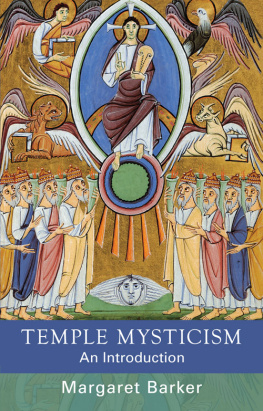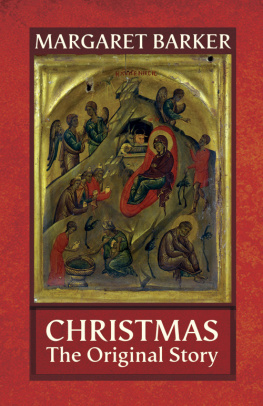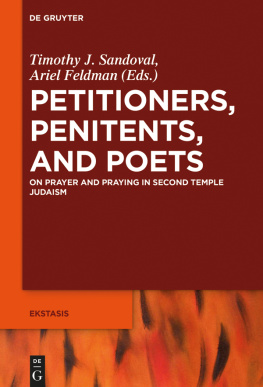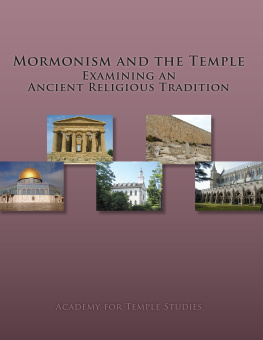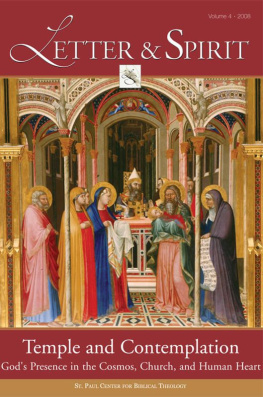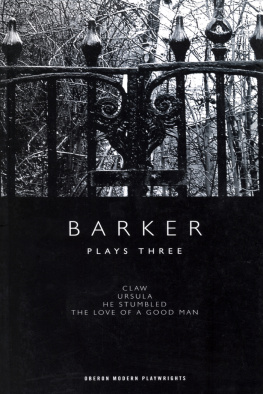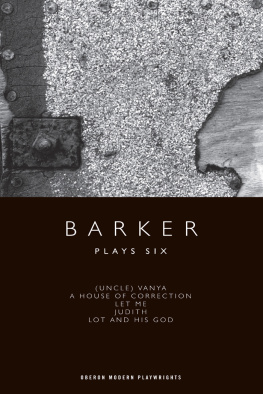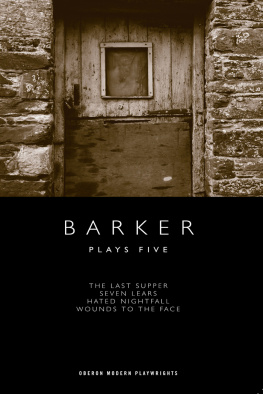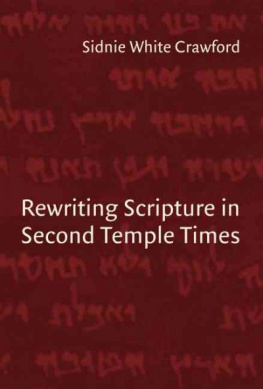Margaret Barker - Temple Mysticism
Here you can read online Margaret Barker - Temple Mysticism full text of the book (entire story) in english for free. Download pdf and epub, get meaning, cover and reviews about this ebook. year: 2011, publisher: SPCK Publishing, genre: Religion. Description of the work, (preface) as well as reviews are available. Best literature library LitArk.com created for fans of good reading and offers a wide selection of genres:
Romance novel
Science fiction
Adventure
Detective
Science
History
Home and family
Prose
Art
Politics
Computer
Non-fiction
Religion
Business
Children
Humor
Choose a favorite category and find really read worthwhile books. Enjoy immersion in the world of imagination, feel the emotions of the characters or learn something new for yourself, make an fascinating discovery.
- Book:Temple Mysticism
- Author:
- Publisher:SPCK Publishing
- Genre:
- Year:2011
- Rating:5 / 5
- Favourites:Add to favourites
- Your mark:
- 100
- 1
- 2
- 3
- 4
- 5
Temple Mysticism: summary, description and annotation
We offer to read an annotation, description, summary or preface (depends on what the author of the book "Temple Mysticism" wrote himself). If you haven't found the necessary information about the book — write in the comments, we will try to find it.
Temple Mysticism — read online for free the complete book (whole text) full work
Below is the text of the book, divided by pages. System saving the place of the last page read, allows you to conveniently read the book "Temple Mysticism" online for free, without having to search again every time where you left off. Put a bookmark, and you can go to the page where you finished reading at any time.
Font size:
Interval:
Bookmark:
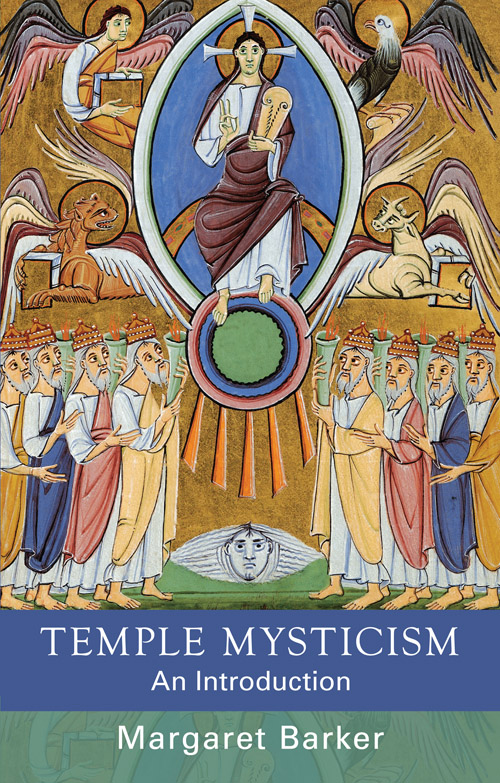
Margaret Barker is an independent scholar, a Methodist local preacher and a former President of the Society for Old Testament Study. She has developed Temple Theology as a new approach to biblical studies, and was given a DD for her work on the temple and the origins of Christian liturgy. For many years, she has been a member of the Ecumenical Patriarchs Symposium on Religion, Science and the Environment, and has made Temple Theology the basis for her work on the environment.
Her recent books include: Temple Themes in Christian Worship (2008), Christmas: The Original Story (2008), The Hidden Tradition of the Kingdom of God (2007), Temple Theology (2004), An Extraordinary Gathering of Angels (2004), The Great High Priest (2003) and The Revelation of Jesus Christ (2000).

First published in Great Britain in 2011
Society for Promoting Christian Knowledge
36 Causton Street
London SW1P 4ST
www.spckpublishing.co.uk
Copyright Margaret Barker 2011
All rights reserved. No part of this book may be reproduced or transmitted in any form or by any means, electronic or mechanical, including photocopying, recording, or by any information storage and retrieval system, without permission in writing from the publisher.
SPCK does not necessarily endorse the individual views contained in its publications.
Unless otherwise noted, Scripture quotations are taken from the Common Bible: Revised Standard Version of the Bible, copyright 1973 by the Division of Christian Education of the National Council of the Churches of Christ in the USA. Used by permission. All rights reserved.
Extracts marked AV are from the Authorized Version of the Bible (The King James Bible), the rights in which are vested in the Crown, and are reproduced by permission of the Crowns Patentee, Cambridge University Press.
Extracts marked GNB are quoted from the Good News Bible published by The Bible Societies/HarperCollins Publishers Ltd UK, and are copyright American Bible Society, 1966, 1971, 1976, 1992, 1994.
Extracts marked JB are taken from The Jerusalem Bible, published and copyright 1966, 1967 and 1968 by Darton, Longman & Todd Ltd and Doubleday, a division of Random House, Inc., and are used by permission.
Extracts marked NEB are from the New English Bible, copyright The Delegates of the Oxford University Press and The Syndics of Cambridge University Press, 1961, 1970. Used by permission.
Extracts from The Book of Common Prayer, the rights in which are vested in the Crown, are reproduced by permission of the Crowns Patentee, Cambridge University Press.
British Library Cataloguing-in-Publication Data
A catalogue record for this book is available from the British Library
ISBN 9780281064830
eBook ISBN 9780281067022
Typeset and eBook by Graphicraft Ltd, Hong Kong
First printed in Great Britain by Ashford Colour Press
Subsequently digitally printed in Great Britain
Produced on paper from sustainable forests
For Bruce Clark
Christ, by whom the eyes of the blind recover sight, will shed on you a brighter light than the sun...
O truly sacred mysteries, O pure light. My way is lit with torches and I see the heavens and God. I become holy as I am initiated. The L ORD is the revealer of the mysteries, He marks the initiated with his seal and illuminates him. He commends the believer to the Father, to be kept safe for ever...
If you wish, you also can be initiated, and you will dance with the chorus of angels around the unbegotten and imperishable only true God. The Word of God will join with us in our hymn.
Clement of Alexandria, Exhortation to the Greeks 12
Contents
Temple mysticism underlies much of the Bible, but it has not been formally acknowledged. I have wanted for some time to collect key texts and ideas, and thus try to recover the ancient system from the scattered fragments that remain, from the echoes and from the shadows.
It soon became clear that much of the system was implicit, and had to be recovered from the underlying assumptions of familiar texts. Doubtless many other texts were lost or suppressed, but there was also oral tradition. Some teachings were not written down even by the literate, because they were secret; others were not written down because they were the collective memory of people who were not literate. The people in Egypt who challenged Jeremiahs theology (Jer. 44.1523) were refugees from first temple Jerusalem, and they saw things very differently from Jeremiah or his later editors. They did not write down their theology, and we have only hints as to what it was. It is not our place, with the wisdom of hindsight and the viewpoint of later orthodoxy, to say who was right and who was wrong.
The Enoch tradition, even though we have it in written form, condemned writing as an invention of the fallen angels ( 1 Enoch 69.910). The ancient high priests, among whom Enoch had his roots, were the only ones with access to the holy of holies and its meaning (Num. 17.7). The laity did not even enter the temple, and so they did not see the furnishings, they did not watch the rituals and they did not hear the sacred words and teachings. These three represent the elements of an ancient mystery religion: the things shown, deiknumena , the things done, dr mena , and the things spoken, legomena . The accounts of the mystery religions, however, are from sources written later than the Hebrew scriptures, and Clement of Alexandria was no innovator when he described Christianity, the heir to the original temple, as a mystery religion.
When the cult of the first temple was destroyed at the end of the seventh century BCE , the priesthood was scattered, and their teachings went with them. Elements of the older ways spread far and wide. They survived in systems that would be labelled gnostic and in texts that would be labelled non-canonical. By apportioning labels like this , the evidence was filtered, and an artificial construct was presented as the religion of ancient Jerusalem. The parts of early Christianity that differed from it were deemed the influence of Greek philosophy, especially Platonism. This, as we shall see, was a serious distortion.
There was an early Eucharistic prayer: As this broken bread, once dispersed over the hills, was brought together and became one loaf, so may thy church be brought together from the ends of the earth into thy kingdom ( Didache 9). I hope this little book will help gather together the scattered fragments of temple mysticism that gave the original vision of the kingdom and flowered to become what we know as Christianity.
My thanks, as always, go to my family who understand computers, to the staff of the Cambridge University Library, and to my friends. I should like to dedicate this book to one of those friends, who may not agree with every word of it.
Margaret Barker
Temple mysticism is the key to understanding Christian origins, but there is no single text or passage in the Bible that answers the question: What is temple mysticism? We have to reconstruct it from the gaps in our understanding of Christian origins, rather like working out what part of the picture would have been on the missing piece of the jigsaw puzzle. The difference is that we do not have the picture on the lid of the jigsaw box, and so cannot be certain what the missing piece or rather pieces looked like. One missing piece would be a simple matter. Indeed, some of the pieces already put into the puzzle may be in the wrong places, or even in the wrong puzzle.
Next pageFont size:
Interval:
Bookmark:
Similar books «Temple Mysticism»
Look at similar books to Temple Mysticism. We have selected literature similar in name and meaning in the hope of providing readers with more options to find new, interesting, not yet read works.
Discussion, reviews of the book Temple Mysticism and just readers' own opinions. Leave your comments, write what you think about the work, its meaning or the main characters. Specify what exactly you liked and what you didn't like, and why you think so.

